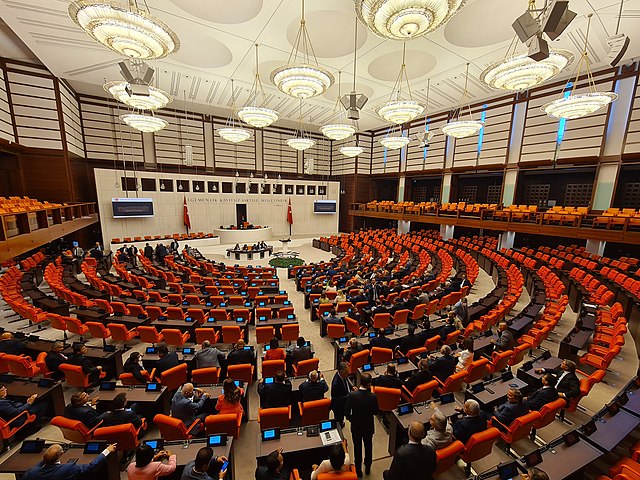Top Qs
Timeline
Chat
Perspective
Legislation of Turkey
Legislative System in Turkey From Wikipedia, the free encyclopedia
Remove ads
The Constitution of Turkey grants sole legislative authority to the Grand National Assembly of Turkey, which is responsible for making, amending, and repealing laws. The Constitution of Turkey stands as the supreme legal framework of the republic, Legislative duties are exercised independently from the Judicial system of Turkey, maintaining the separation of powers within the state.

Historically, the head of government was the Prime Minister of Turkey, who led the executive branch alongside the President. However, following the 2017 Turkish constitutional referendum, Turkey transitioned from a semi-parliamentary system to a presidential system. This reform abolished the office of Prime Minister and transferred executive powers to the President of Turkey, who now serves as both the Head of State and the Head of Government.
The Grand National Assembly of Turkey remains the sole legislative body in the country.[1] While the Grand National Assembly of Turkey holds the sole and foremost power of legislation in Turkey, New laws and legislative decisions can be vetoed by the President of Turkey.[2]
Remove ads
Responsibilities of legislative bodies
The legislative bodies of Turkey and the bodies that uphold them have a set of responsibilities. The main responsibilities of the assembly are deciding on the annual budget, making decisions on laws and rules, and working with other bodies, like the executive branch. The Assembly is also supposed to be fair and work together with the opposition.[3]
The president is the head of the executive branch and can veto and redirect the Grand National Assembly of Turkey's verdicts. As the leader of their party, they can hold both legislative and executive powers at the same time. The president is expected to be independent, transparent and fair.[2] Formerly belonged to the Prime Minister of Turkey.
Remove ads
Legislation in Judiciary and Executive
Summarize
Perspective
Turkey's legislation adapts the rules of Secular values and Social Democracy when it comes to judicial and executive decisions. The Constitution of Turkey separates religion from powers and separates the state powers within bodies and institutions,the government, in theory, operates under democratic and constitutional principles. [4] [5]
Judiciary
The Judiciary of Turkey follows the Constitution of Turkey, and its job is to implement and oversee the legislative decisions after the Grand National Assembly of Turkey enacts them. The judicial system, in theory, functions independently and is responsible for reviewing laws, protecting constitutional rights. In principle, the judicial system functions independently from the legislative and executive branches. Institutions that uphold these judicial functions include:
Executive
The Executive of Turkey operates under the framework of the Constitution of Turkey and is responsible for enforcing laws passed by the Grand National Assembly of Turkey. The executive branch carries out state administration. It implements legislative decisions, coordinates public institutions, and manages both domestic governance and international relations. [6]
Remove ads
See also
References
Wikiwand - on
Seamless Wikipedia browsing. On steroids.
Remove ads
